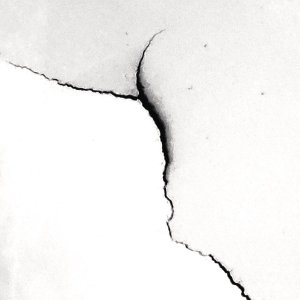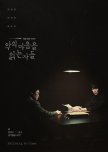
Kim Nam Gil shines in lacking profiler drama
I wanted to love this drama but came out thinking it could be so much better. My criticism might seem harsh but since people usually rave about this drama I will focus on the negative aspects. That doesn't mean I didn't highly enjoy watching it and still gave it a 4/5 rating.The argument 'Through The Darkness is a lesser Mindhunter' has been made so often and it might be true, but that is no valid criticism of the former so I won't hold that against it. In general I'm tired of the automatic reflex to compare every Asian drama or film to Western media and will judge it on its own terms.
Through The Darkness tries too many things at once. There are dozens of crime shows or dramas that focus on the police procedural aspect of crimes. We don't need one more.
The theme of building a new organizational structure and developing a new angle in police work is vital and is well told.
The actual profiling, the interviewing, analyzing clues, hypothesizing, coming to conclusions is not given enough room and breathing space. They seem to gloss over or misunderstand basics of profiling, starting with body language they exhibit to what they discuss before, during or after interviews. At one point we are told that they have done hundreds of interviews. This is an informed attribute since the understanding and knowledge base that should come with this amount of experience simply isn't there. Through The Darkness takes a very long time for the profiling to get off the ground and for the profilers or interviewers to actually understand their job.
Literal Title: Those Who Can Read Hearts Of Evil. Can you, though?
The main character Song Ha Young is all over the place. He is at times overwhelmed with anger and repulsion, is highly judgmental, empathic, analytical, sensitive, righteous, obsessive, stoic, starting to become evil, understanding and volatile. Of course he can be all those things but I fail to see a natural progression of those psychological states.
The drama feels both rushed and drawn out. They could've easily made it into a 16-episode drama, expand on cases, show more interviews and allow scenes to linger for a little bit more for impact.
This is mostly a quiet job in a dark room and Through The Darkness focuses very much on the thrill of the crime instead of the thrill of the crime analysis.
The music adds to that as many scenes have underlying music made to heighten the tension and thrill. Since the music competes with the dialog it takes away from an already tightly scripted scene which isn't allowed to shine on its own.
It seems the creators didn't really trust their material.
All the involved actors are great and Kim Nam Gil does an outstanding job with a very difficult, not very flashy, very introverted and highly sensitive character. As far as I know he has never played anything like that before (Lovers Vanished and One Day come close) but he is made for it.
Was this review helpful to you?
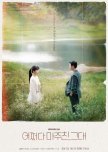
This review may contain spoilers
Every little detail is meaningful
I will never again watch an on-air Murder Mystery Drama weekly, the suspense almost killed me. This is one of the best Murder Mysteries I have ever seen though, so no complaints.My Perfect Stranger lives in the comfortable space between a high-octane crime thriller and a vivid 80's time travel melodrama. The fact that both main leads want to change not only the course of their own life but the ones of their close ones and go back in time to do so makes every single scene, conversation, even a mere gesture loaded with meaning. There is a lot of healing involved with a little romance on the back-burner. It is sometimes laugh out loud funny, often tragic, but always touching.
The story is also one of the most complicated murder mysteries with even so much detail and so many moving pieces that when all is said and done many questions are left unanswered. That doesn't substract anything from the final picture, if anything it adds a layer of intrigue and might benefit the rewatch value.
Episode 1.9 - the young Hee Sub hobbling, intercut with the elder Hee Sub hobbling - simply shattered me. Yu Sub with the watch, Hae Joon carrying him (one of the best unintentionally gay moments ever), the father-daughter-dynamic moved me the most. What a chance to be there as a witness, how you suddenly see someone close to you in a completely different light, and to be able to change circumstances, such a dark yet powerful moment.
In the end the healing aspect comes full circle and becomes self care - make your own life better. Tell the ones that need to know. Small adjustments can mean a world of difference.
Phenomenal Drama.
Was this review helpful to you?

This review may contain spoilers
Solid but not without its share of problems
Pros- overall soothing atmosphere
- focus on self-care and healing
- focus on shy, introverted characters (after Liberation Notes and others this seems a recent trend in K-Dramas, which I love)
- found family theme
- the character of Dae Beom (Im Si Wan has such a knack for creating unique, weird, intriguing characters from scratch who truly come to life)
- many characters I instantly disliked have grown on me, e.g. Ji Young, Sung Min
- chemistry between ML & FL which is great without even so much as a kiss
- acting for the most part (Kim Seol Hyun managed a lengthy drunk scene without ever being over the top, annoying or silly, you can't take your eyes off of her, great physical acting)
Cons
- Yeo Reum falling back into her little-girl-routine gets tedious and feels insincere after some time, it is a way of denying responsibility (which is understandable, she is there to overcome trauma and not find more trauma, but being there and living her life and being part of ongoing issues is still a responsibility she can not possibly escape)
- Yeo Reum being a little self-righteous at times, which would be fine, except I gather we are supposed to root for her
- toxicity here and there (how dare you scream at your family/grandma), a recurring feature of this director, familiar from Coffee Prince and Cheese in the Trap
- cramming a crime plot into the last episodes that is resolved as fast as it pops up, which is laughable
A solid 4/5.
Was this review helpful to you?
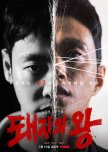
This review may contain spoilers
Brutally good
One of the best things I have seen in quite some time.
Raw, devastating, complex, beautiful, unflinching, a masterpiece.
------------------------------------------------------------------------
Less action-oriented than Weak Hero, more character-driven, slower, more real. Exudes a darkness so substantial, an edgy gloom, a tone so deeply depressing it almost equals "No Longer Human". For mature audiences or those who can handle the trauma inflicted in the drama as well as on the viewer. Adults are notably absent here, in a way adults are absent in Stephen King's "It".
A clear-eyed look at school bullying, its consequences and all the harsh realities that come with it even into adult age. There are a lot of revenge dramas out there but this is one of the few where the revenge feels justified. Deeply wounded, flawed, complicated main characters looking for a way to cope in circumstances that leave seemingly no way out.
Was this review helpful to you?
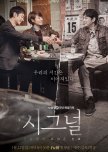
This review may contain spoilers
Lee Jae Han forever
This Drama is on a whole other level. I have never seen anything like it.Starting with the hyper-high-octane nature of the Drama that makes 24 look slow, Signal is at the same time like a Russian novel, more complex than even Stranger 2 (which feels like a discourse in political philosophy they had the guts to make into a Drama).
I can overlook obvious flaws, like the decision to play up overly emotional moments which feels manipulative at times. During the course of the Drama I realized that emotional trauma makes up the crucial moments of everyone's life. Also, certain scenes are repeated over and over, because those crucial moments in life stay with you and are the ones you ruminate over.
These emotionally loaded scenes contrast with and bring depth to the gripping hunt for criminals and make for much needed breathing space. The Drama also infuses a very dark story with a lot of hilarious comic release moments that feel almost brutal in how they break the tension.
I think the storytelling and pacing is absolutely masterful here. It builds a perfect circle.
Signal seems to say that suffering is something you might never overcome but you can use as powerful motivator to change yourself and your environment. Without that you might live a more comfortable life but there is a price to pay for it, which may be the suffering around you.
Signal is about what makes you who you are. It closely examins in equal measure trauma, transformation and transcendence. It is healing and, in every sense, life altering.
I feel like I have lived an entire lifetime with these characters and consequently the connection I have to these people is much stronger than with other characters.
Watching Signal is an all-consuming, exhilarating experience.
This is largely due to one character and the acting involved in creating him.
Lee Jae Han: shy, socially inept, an almost naive idealist, tremendously sensitive, stubborn, defiant, gentle, strict, with a strong sense of justice, cheeky and bold, innocent, who shoulders too much responsibility, emotional, caring, grumpy, charming, unflinching, perpetually annoyed and frustrated with anyone and anything standing in his way, no-frills-no-bullshit-no-time-to-waste, quite a temper, empathic, a little silly, no sense for playing politics whatsoever, who over time embraces his outsider status, stepping over every line and on every toe in order to do what he believes is right.
Cho Jin Woong marry me.
Was this review helpful to you?

glamorized dullness
Cursory watch.Glamorized boredom, kind of dull. Waste of a great soundtrack, cozy but overproduced with insta looking cinematography and ridiculous plot elements like a graphic artist having a manager babying him (which graphic artist is so rich they have a practically live-in manager duh).
Dislike the FL actress and character. I don't get her appeal at all, which is a lethal flaw for a romance drama which centers on the development of the relationship and main characters. Love both the SL actors and characters. NJ is "the least annoying female SL ever" which seems to be the consensus, and I agree. The second lead is quietly heartbreaking in his guarded stoicism. Honestly, the drama could have been so much better with those characters more in the spotlight.
Was this review helpful to you?
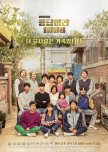
This review may contain spoilers
Resolution leaves something to be desired
I have two review versions.Reply 1988 is
like a Michael Jackson song
like the youth you never had
like the youth you had
like a warm blanket
----------------------------------------------------------------
There is not a lot that hasn’t been said about Reply 1988. That’s why rather than trying to simply rehash what others have written before I want to focus my attention on the love triangle, its resolution, on the last episodes and the ways in which they might be lacking.
It seems to me that there is some fluff during the last episodes and uncharacteristically the focus shifts from Deok Sun to Bo-ra, and from the young to the older generation. My theory for this is that Jung Hwan made up a huge amount of the drama, and when they finish the love triangle story arch with episode 18 it changes the dynamic very much.
Deok Sun and Taek, despite being really sweet together, have no real romantic chemistry and the moment Jung Hwan leaves the triangle their romance plot falls flat on its face. The writer/producers might have seen that and tried to stuff the episodes with other people's issues which is honestly fine, but it nevertheless leaves something to be desired. You can argue that even the writer/producers have not enough confidence in the Deok Sun/Taek storyline from the moment the love triangle is over to give them a proper ending. So did they make a mistake in choosing Taek over Jung Hwan?
I am sure Taek was supposed to be the one from the start, something many people in #teamJungHwan are doubting who say they switched the one Deok Sun ends up with midway. I don’t think that. But what couldn't and can't be accounted for, what nobody could anticipate, is the real-life chemistry between the actors on set, something that develops during filming, the chemistry which surely favores Jung Hwan over Taek. The other point is simply what an actor makes out of a role, and clearly Ryu Joon Yeol is an outstanding actor who gives depth and complexity to this character and is immensely charismatic. Everything he does is simply unmissable. This, too couldn’t be foreseen. Equally, Park Bo Gum is a terrific actor with a delicacy that is quite rare in Korean dramas.
Jung Hwan is notably absent form large portions of the last episodes, but so are Deok Sun and Taek. Basically the makers seemed to go out of their way to leave Jung Hwan out of the plot, and whenever he wasn't around something was lacking. Reply 1988 being based on a real story means Jung Hwan's ending originally was different (he was supposed to die in a plane crash, being a fighter pilot), which luckily they changed. They could've changed it even more and changed Taek's role too, if they wanted to.
Both the chemistry and acting point toward Jung Hwan's role having a bigger ending than somehow fizzling out. But be that as it may, crucially, the makers seemed to also not have been very confident about the main couple, so they circumvented putting more time and effort into their storyline by embroidering other's. This goes above and beyond of the mechanisms of Second Lead Syndrome where it might be calculated that viewers favor the second lead getting the girl because it spices things up. There is a weird vacuum because these miscalculations are not properly addressed. There is no solution to the plot being somehow anticlimactic, but I am kind of glad they didn't add insult to injury by making up a happy-go-lucky ending for Jung Hwan.
Not having romantic or sexual chemistry is one thing but the writing has Deok Sun/Taek's relationship as more of a child/caretaker or sibling one. Taek maybe needs a mother or noona more than a girlfriend, and I don't think it's desirable to couple a young woman with a young man who is unable to "tie his own show laces" because she is so good at caring for him.
Of course the equally valid point can be made, and has been made, that no woman would want a man who continuously treats her badly and calls her ugly and stupid because he can not deal with his own feelings. He consistently chooses a negative, petty, mean approach, to protect himself from hurt, or because he is somewhat of an asshole. There is no good explanation why he can not even be different when he is alone: He wishes for Taek to be a jerk which would be bad for her too, and he secretly enjoys the fact that Sun Woo doesn’t like Deok Sun back. He resorts to negative thoughts and wants nobody else to have her instead of wishing the best for her.
Some people say Jung Hwan doesn't deserve her, yes, but the way he behaves until the end is a writing decision. Others say Jung Hwan is stronger and can deal with losing Deok Sun, but it would hurt Taek, maybe send him into even worse drug problems, which he would never recover from. While this is an intriguing point I don't think Taek should be coddled the way he always was coddled, well into his adulthood, just because he is supposedly weaker. Jung Hwan might be able to get over Deok Sun but to say he has to because he can deal with it is kind of cruel. The way he tends to bottle up his emotions is no sign of strength and I would have loved to see him open up and be vulnerable for once.
Of course, Jung Hwan as emotionally unavailable, distant love interest with an equally huge amount of meanspirited quips as well as wordless galantries is the kind of guy women easily fall for. He seems like a mixture of a Tsundere with a Kuudere type character. Mean, harsh, jealous, vengeful, unemotional, guarded who has a huge amount of belligerent sexual tension with Deok Sun. But the extent to which I would argue this is abused here makes Jung Hwan seem like a cheap plot device. He is good enough to provide heartfluttering moments, raise the tension and keep the love triangle alive but not good enough to be developed into something more. He deserves better.
Maybe, just maybe, this is not a bad plot device, and not bad writing, maybe this is intentional and what I am just writing proves just how great Jung Hwan is written and played, and just how they have succeeded in breaking our hearts. And the heartbreak, sorrow, even trauma wouldn't have happened if it were any other way.
With motherhood being such a huge part of Korean culture and even of this drama, I can see why the writers don't have a huge problem with choosing a partner who is essentially child-like in many ways, who needs mothering, and have this be a fundamental part of their relationship. I think it romanticizes motherhood and leaves Deuk Sun with the short end of the stick. From a Western perspective at least it seems strange, if not icky, to show marriage largely as one taking care of the other. From this perspective a romantic relationship is about two people meeting at eye level, not one looking down on the other. Maybe the flaw lies in the writing and Taek/Deuk Sun is never shown to evolve into a more equal kind of relationship. Taek has his moments and is mature in different ways, but he always stays a needy child in others. To be fair, Jung Hwan equally is never shown to fully evolve into someone who treats Deuk Sun well. So you have someone who looks down on her or someone who looks up to her, and of course you would want the latter for your female lead character.
You can complain that Deok Sun has been forced into a caretaking role just because it is her nature, which is unfair. You can also look at it from another angle - Deok Sun is simply a stronger person. She can take care of Taek and be a grounding influence on him just because she is smart, pragmatic, realistic, tough and mentally strong. This makes her not stuck in an antiquated role but, quite the opposite, a very modern heroine.
Jung Hwan hurts himself as well as Deok Sun by pushing her away, hesitating, ruminating and giving major mixed signals. Taek never once deliberately hurts her. That in and of itself should be enough to give Taek the upper hand. But it also makes Jung Hwan so much more interesting, because you can never forget the people who hurt you and there will always be lingering questions like 'why....' and 'what if....?'.
There is a scene when Dong Ryung asks Deok Sun whom she likes more, Taek or him, and without hesitation she says Taek. But when he asks whom she likes more between Jung Hwan and Sun Woo, she answers evasively. This seems to mirror Taek's/Jung Hwan's feelings. I always felt that Deok Sun loves Taek, and isn't afraid to express it, and that she likes to take care of him and is very protective of him, but that she is in love with Jung Hwan. It is fitting that after being very vocal about her feelings for Sun Woo she would tread lightly and be cautious to not get burned again.
Mid-drama it is clear that both Taek and Jung Hwan have romantic interest in Deok Sun, but there is never an easy answer as to what she feels. If there is an imbalance of feelings the final episode unwisely exacerbates it: Once more we learn about Taek’s feelings which were never in doubt. This emphasizes even more that her feelings are still somewhat of a mistery, which leaves a bitter aftertaste. It makes me think of the cheesy male-written line from Titanic: “A woman’s heart is a deep ocean of secrets”. If that were the case the writer could’ve worked that into the script, they could’ve left room for doubt, longing, inner conflict – particularly in a drama centered around sentimentality. Instead the romance is resolved and everything else is simply left to be forgotten, which is offensively stupid.
In a way whom Deok Sun ends up with is very fitting to who she is as a person. She has always been a people pleaser and never had a dream of her own, she always reacts to being liked rather than liking someone herself. So she ends up with the one capable of consistently showing his affection towards her. We'll never know whether what she likes herself is actually different. Probably she doesn't know herself.
Deok Sun is also pragmatic, and her whole personality is grounded in reality. Despite what other characters say about him I believe Jung Hwan is romantic, and sensitive, and the fact that he is not capable of expressing his feelings adequately only makes him more so. Jung Hwan has the most romantic gestures of the two love interests, and quietly he is very perceptive, very sweet, and very idolizing. I don't really know whether this at all translates into a real-life relationship and maybe Jung Hwan feels that adoring Deuk Sun from afar is already the best part of it. Maybe he wants her to remain an idea in his mind, untouched by reality. Maybe, like he says, he isn't very courageous and hides his insecurity behind a mean facade. In this regard Taek is very confident, he doesn't need to hide behind anything. He also experiences many tough moments with Deuk Sun (the flasher, being in China, carrying her out of the stadium, giving her medicine) and his strength lies in being there and dealing with it all like a mature person. Taek is already real-life tried and tested.
I think Taek is a great guy and I'd have no problem with Deok Sun ending up with him, if it weren't for Jung Hwan. In fact, they are both tremendously intriguing, flawed, complicated characters whom I love from the bottom of my heart and choosing between them is literally like Sophie's Choice, only worse.
As it stands this might be one of the most traumatic, heartwrenching, tragic endings I have ever seen. Maybe the impossibility to find a perfect solution with everything wrapped up neatly is part of what makes Reply 1988 so good. When all is said and done, and reality sets in, the reality we see drawn out which seems not a bad place to be in, there is still that someone in your memory, there is still something unfulfilled, just one more reason to be sentimental for your youth.
Was this review helpful to you?
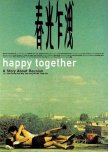
This review may contain spoilers
The melancholy of loving
A volatile relationship (between two men and a third entering the picture, where the gender is only incidental to the proceedings), youth, living abroad in a tiny room in Argentina, shadows and light, a tango bar and existential pain assume an organic, cogent, naturally occurring chemical compound.Almost plotless. Visually striking. But thankfully with less repeated music than other Wong Kar-Wai films.
Among the three leads Chang Chen is the most gorgeous, he looks like Ji Chang Wook's big brother.
Was this review helpful to you?
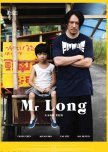
Yojimbo made by Kitano
This is very nearly a perfect film.It is what Yojimbo would be if it was made by Kitano.
- artsy
- gorgeous male lead
- who doesn't say much
- but does stuff
- which you can watch him do
- for 2+ hours straight
- asmr
- stripped down storytelling
- quiet
- tender
- found family
- japanese
- female gaze
- style plus substance
- slow moving
- hypnotic
- visual
- gorgeous score
Tired of "slow" used as pejorative, qualified with a "but".
Chang Chen doesn't need dialog, in fact he is better without.
Was this review helpful to you?
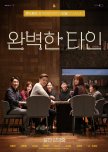
This review may contain spoilers
A game that unravels fast
If you like 'Who's afraid of Virginia Woolf', 'The Boys in the Band' or 'Scenes from a Marriage' this should be for you.Like the aforementioned films Intimate Strangers has a lot on its plate but manages to deal with it in a very careful, mature and profound way.
Some people say despite the one-room-setting it never gets boring. This kind of verbose play-like house-thriller setting is one of my favorite film settings and I have never seen a boring movie come out of it. Human relationships and conflicts, communication and psychology are almost indefinitely interesting themes if done right.
One of the many questions I ask myself is why Ye Jin, a psychiatrist, even suggests playing that game when she know she has something to conceal. Maybe she wants to be found out and provoke a crisis in her marriage because she is in an emotional crisis herself. Too bad for her, because I am pretty sure Suk Ho deliberately ignores what he instinctively knows about his wife. Maybe this is the way these two miscommunicate, between stoking conflict and shying away from it.
There are other moments when characters prevent something from being outed, maybe because they subconsciously know there is something going on, maybe because they don't want to know. In another instance someone ends an embarassing moment for the group that could potentially disrupt the evening and the friendship.
The whole scenario is like a social psychology experiment done in a good way. There is projection, denial, Freudian slips, everything. What I love about it is that the material never chooses the easy road of men are this and women are that, in fact there are many facets of greatness despite all flaws in everyone.
Depending on the topic of discussion the film makes the interesting observation that bonds are built, broken, and re-built, along the lines of time spent together, gender, age, education, social status, belief and personality.
The characters are all multidimensional and feel lived-in, and there are noteable blanks in character introduction, questions are left unanswered, which means more is under the surface than is being shown. This is one more aspect that makes the film very thought-provoking.
There is really nobody among the group without redeeming qualities, nobody I don't like. The only person that annoyed me for the longest time is Se Kyung but even she develops in a way that by the end I deeply empathize with her.
The most fascinating character to me is Tae Su, because once you peel off layer upon layer of brusqueness you learn how far he is willing to go for people, what a decent person he is underneath, a burden he carries by being constantly grouchy.
I like the state each one is left in, from people who are exposed completely, to others who get away with slight scratches, to one who chooses to lay open their secret. It's a very intelligent, tender way to handle the characters. One of the many things to adore about the script.
The sliding-dooresque twist at the end is such a clever idea and makes you ponder which world you want to live in, which option you would choose, it invites philosophical musings about the truth in relationships.
I am trying to gather my thoughts about why I think this kind of no-holds-barred sujet isn't suited for South Korea. They all talk very fast and act so cutesy and the cold hard truth demands time and depth in a way I don't associate with South Korean culture. They constantly hurt each other but gloss over it with the stereotypical tough love attitude.
It's as if the film itself wants to deal with heavy subjects but also doesn't want to alienate any part of its audience so it tries to be provocative while still playing it safe. Maybe this in itself is an indictment of middle class values.
There are no-holds-barred films from South Korea no doubt (e.g. No Regret), but I guess they are more Independent than this one.
This is an ensemble cast with no weak link but I still have to point out how outstanding without being disruptive Yeom Jung Ah is.
Was this review helpful to you?
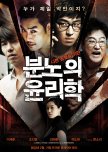
This review may contain spoilers
Alternative Title: Men are Pigs
I am unsure whether I am more intrigued by the shameless honesty of the movie or repelled by everyone being unduly perverted. I am not known as being a prude but wow "Ethics of Anger" (original title) definitely is crammed with as much ugly shit and disgusting men as possible.The movie starts and stops too often which disrupts the natural flow. The sequence of actions could have been much more smoothly if the writing was better.
There are great observations in there, hilarious sequences and at times wonderful acting. Cho Jin Woong as dying gangster is among the best things he has done. Lee Je Hoon is an unlikely great fit for a voyeur.
A shame that overall the movie is rather forgettable.
Was this review helpful to you?
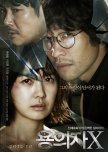
This review may contain spoilers
mathematician's answer
A movie that by the end you realize is about something completely different than what you thought it would be. I quite like the twist in the end and the message the movie conveys, given the dilemma it starts out with.I have a problem with the female character, I simply don't like her very much, she acts desastrously stupid for a person in her situation, which makes her look weak. By the end I empathize with the male lead but it takes a long time to get there. The only character I think is likeable throughout is the cop, who is clever without losing his humanity.
There are several implausibilities, e.g. what does the lead know about actual police work, how improbably fast do they uncover certain facts, and lastly, this genius brain comes up with such an elaborate ploy for something that could have been solved maybe even without a murder charge...
Solid mystery-thriller deepened by the melodrama in the end. Great score. Cho Jin Woong elevates the movie, like he always does.
Note to Self: Need to watch the Japanese original if only for Shibasaki Ko.
Was this review helpful to you?
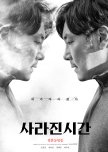
Lost time
I just love the place this assured directorial debut and small independent film takes me.The original title, "Lost Time", conveys a lot of it: The confusion of waking up unsure where or what or who you are, weighed down by memories, an indescribable feeling of loss, the heaviness and fragility of life, identity, choices and their consequences, change and inertia, alienation and doubt, metaphysical ambiguity and existential angst.
All this is handled in a diligent yet lighthearted manner (although I wouldn't exactly call it a black comedy as it is described here and there). The mind-bending script is clever not for its own sake but actually clever and full of substance. Great acting, soundtrack, pacing, atmosphere.
You have to live for a long time to be understood for a moment. And this is maybe all you can ask for.
Was this review helpful to you?
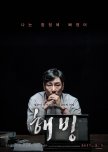
This review may contain spoilers
Unsettling
A gripping psychological horror-thriller with a tense, eerie atmosphere, a more than serviceable score, a plethora of intriguing characters, twists and turns. Great cinematography, color palette, framing and blocking is masterful.Bluebeard, (original title "Thawing") starts strong, the plot twist around 2/3 of the runtime is so convoluted I couldn't believe it, which is why I love the ending because I want that to be the truth. Still, there are many unanswered questions, this movie might need repeat viewings.
Cho Jin Woong is phenomenal as a suffocatingly repressed, uptight yet sensual, nervous but closed-off, righteous, shy, depressed, calm man who is slowly driven out of his mind. Kim Dae Myung is very convincing too as a mirror character between trying to keep control over something increasingly terrorizing and carefully weighing each step towards his new neighbor.
Was this review helpful to you?
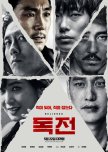
This review may contain spoilers
Wasted potential
It is puzzling why a movie that has at least 3 great actors, gorgeous cinematography, a reasonably good soundtrack and over the top hilarious gripping sequences, is not better as a whole. I need more background on the main character, on his motivation and personality. I also need more character development scenes, some quiet moments maybe. Why should I care for any of these people. So much wasted potential.Things I loved
- Kim Joo Hyuk who steals the movie from Cho Jin Woong
- Cho Jin Woong forced into a double mascerade while still visibly being who he actually is
- Ryu Joon Yeol, particularly his reaction shots, he actually steals the movie from everyone
- several sequences where the action is energized by the soundtrack
Was this review helpful to you?

